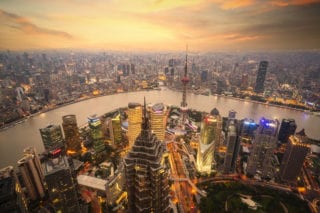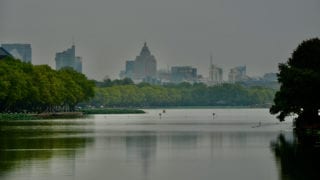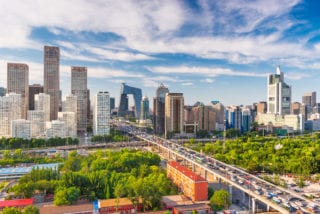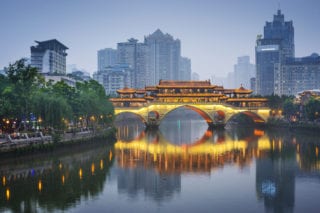 Moving to China? Here are the Best Places to Live as an Expat
Moving to China? Here are the Best Places to Live as an Expat
China has become an alluring location for expats. With its successful economic growth, it offers residents an ever-increasing number of opportunities. But if you’re moving to China on your own, rather than being relocated by your company, you may be wondering which are the best places to live in China.
As a large country, China offers an incredible amount of living options, though most expats concentrate on finding the best cities to live in China. There are so many Chinese cities, from huge metropolises and smaller towns, that you’re certain to find the right spot for you.
Whether you’re a digital nomad, in business for yourself, or teaching English, if you’re considering moving to China and don’t know where to relocate, this short guide is for you. Let’s have a look at the most expat-friendly cities in China!
All figures below are in either United States dollars or Chinese yuan.
Understanding China’s City Tiers System
Researching the best cities to live in China will, at one point or another, lead to learning about China’s city tiers. The tiered classification system is based on a city’s GDP, population, and political administration. Tier 1 cities are the largest and richest, and are directly administered by China’s central government; Tier 2 cities have fewer people and smaller GDPs, and so on through Tier 4.
China’s city tiers are not an official government designation. As such, there can be debate about which cities belong in which tier. However, Shanghai, Beijing, and Guangzhou are universally seen as first-tier cities. They are China’s most densely populated urban metropolises, which wield substantial economic, cultural, and political influence.
Newer Tier 1 arrivals such as Hangzhou and Chengdu are also among the best places to live in China. These are more recently developed areas that provide excellent investment and overseas work opportunities for expats.
5 Best Cities to Live in China
Our classification of the best places to live in China considered the top priorities of expats. We looked at available activities, access to China’s healthcare system, local weather, and the cost of living in China.
Shanghai
A longtime Tier 1 city, Shanghai is a popular tourist destination, international hub, leading business center, and one of the best places to live in China. It’s also China’s most populous city, with 24.8 million residents as of 2020. It has a large metro system and is home to the world’s first commercial maglev train line.
One of the city’s most well-known areas is the former French Concession, the European-looking section of town administered by the French from 1849 to 1946. The Bund, Shanghai’s waterfront, is also a delight to visit, as is the shopping district on Nanjing Road. Tourists and residents in Shanghai also enjoy the City God Temple and Yu Gardens.
Life in Shanghai provides access to world-class restaurants, nightclubs, cafés, bars, and shopping. However, as in other top international destinations, the cost of living in Shanghai can be expensive. A one-bedroom apartment in the city center would rent for an average of $1,300 per month.
Living in Shanghai means you’ll experience extreme temperatures: muggy highs in the summer and chilly winds during the winter. Shanghai does have a problem with air pollution, with high rates of hazardous PM2.5 particles, sulfur dioxide, and nitrogen dioxide.
 Hangzhou
Hangzhou
One of the newer entries to China’s list of Tier 1 cities is Hangzhou. Home to 11.9 million people as of 2020, it is definitely one of the best places to live in China. Hangzhou is connected by rail to Shanghai and Ningbo, and serves as an export base for east-central China. Its stunning Xi (West) Lake is a UNESCO heritage site. The lake is a favored topic amongst poets and painters, and its beauty even enchanted Marco Polo. With such natural wonders, Hangzhou is a big tourist draw. The city is also famous for its silk production< and can boast of being the birthplace of China’s famous longjing (“dragon well”) green tea.
Hangzhou is home to several universities, including the esteemed Zhejiang University. An affiliated hospital, First Affiliated Hospital of Medical School of Zhejiang University, is one of China’s top hospitals. You can also go to North American International Hospital of Hangzhou, where staff and doctors speak English.
Rent for a one-bedroom apartment in Hangzhou varies. You’ll find summer in Hangzhou is hot, but not too long. It can get quite chilly during the winter!

Beijing
As you’re likely already aware, Beijing is China’s political, cultural, and educational capital. A combination of culture, history, and modern architecture gives Beijing an electric vibe and makes it one of the best places to live in China. There are multiple UNESCO World Heritage Sites in and around Beijing, including the Great Wall of China, the Summer Palace, and the Forbidden City. Besides history and heritage, Beijing cuisine is famously delicious. It is the birthplace of “Peking Duck” and other delicacies.
With a population of approximately 21 million people, Beijing is the second-largest city in China. It is a sprawling metropolis, but it has an efficient transportation system that consists of multiple metro lines, buses, bike routes, and electric scooter rentals.
If you move to Beijing, be prepared for humid summers and chilly winters. Beijing also has issues with air quality, though anti-pollution measures have reduced the levels of hazardous PM2.5 particles in recent years.
If you require healthcare in Beijing, you have an excellent range of international hospitals to choose from. See this list of the best expat hospitals in China for more information.
Rental prices are comparable to other first-tier cities. Renting a one-bedroom apartment in the city center can cost you around RMB 7,500 ($US1,175).
Shenzhen
Shenzhen is generally considered to be a Tier 1 city, though its growth is relatively new. Back in the 1970s, Shenzhen was a small city of 30,000 located north of Hong Kong. In 1980, it was designated as a special economic zone, meaning it was able to accept investments and make economic decisions without intense oversight from the central government. The result was explosive growth in its economy and population (to 17.56 million as of 2020). Shenzhen is now one of China’s financial centers.
Among Shenzhen’s attractions is the famous “Window of the World,” a theme park featuring scaled-down replicas of famous landmarks such as the Eiffel Tower. You can also visit China Folk Culture Village and the Xianhu Botanical Garden. Shenzen is connected to Hong Kong via a bridge over the South China Sea and by metro.
Given its location, Shenzhen has a very hot and humid wet season, but its dry season is comfortable. A one-bedroom apartment in the city center, the Futian District, will cost you approximately RMB 7,500 ($1,175), though less expensive rentals are available in other parts of Shenzhen.

Chengdu
Chengdu is the capital of Sichuan province, with a population of 20.9 million as of 2020. The city has two international airports. A high-speed train makes the trip to Beijing in 8 to 10 hours; the Chengdu-Europe Express Rail connects Chengdu to Nuremberg, Germany.
Those train lines are just the beginning of Chengdu’s connection to the world. The Belt and Road initiative is the name for a set of infrastructure projects and investments China has been making in other parts of the world. Development is taking place in Asia, Africa, and Europe; the connections being made harken back to the Silk Road, a trade route that flourished during China’s Han Dynasty.
With the Belt and Road initiative, Chengdu’s location could see it become an increasingly important gateway between several economic and trade centers. As Chengdu is a base for hi-tech industry, it also boasts growing wealth and job opportunities.
But tech and transport aren’t the only things that Chengdu has going for it. Tourists love visiting Chengdu’s Research Base of Giant Panda Breeding. Another Chengdu highlight is stopping by lovely teahouses. The area also has three ski resorts and Sichuan province’s famously spicy cuisine.
Summers in Chengdu are warm and humid, while winter is cold with clear skies. Renting a one-bedroom apartment in Chengdu’s city center is approximately RMB 5,500 ($860) monthly, though other parts of town can be much cheaper.
What Is It Like to Live in China?
One of the exciting parts of moving to a new country is discovering what day-to-day life is like once you get there. You won’t know exactly what your daily life will be like until you get there. However, here are some general tips about what it’s like to live in China.
China is a large country, but travel is becoming easier every day as the Chinese rail network adds faster and faster trains. It’s also simple to fly domestically.
Though there are people who speak English, or who are willing to pay you handsomely to teach them English, you should be prepared for language differences. Learning a few phrases in Mandarin, and perhaps also Cantonese or a local dialect, will make your life much easier. If you already speak Mandarin, you’ll likely have numerous job opportunities to choose from. However, depending on your skills, you may be in demand by companies even if you can barely say “hello.”
If you’re lucky enough to be invited to someone’s home, or to a get-together with a business partner, bring a small gift with you. It’s polite to do so, and will help you make a good impression!
After Finding the Best Place to Live in China, Find the Best Insurance

Find the Best International Insurance
- Compare multiple quotes and coverage options
- Work with an insurance expert at no additional cost
- Find the best plan for your needs and budget
Related:


